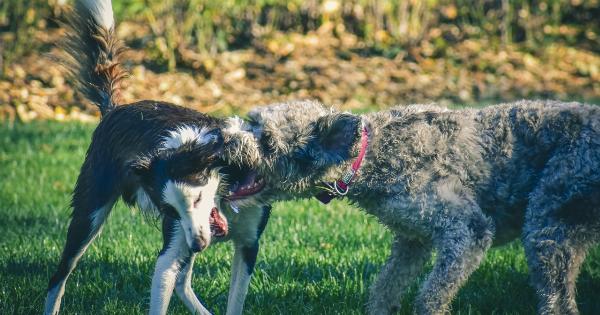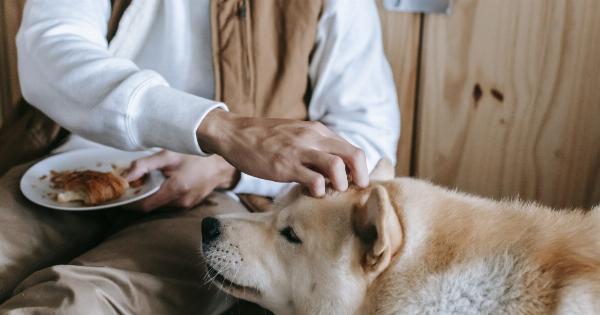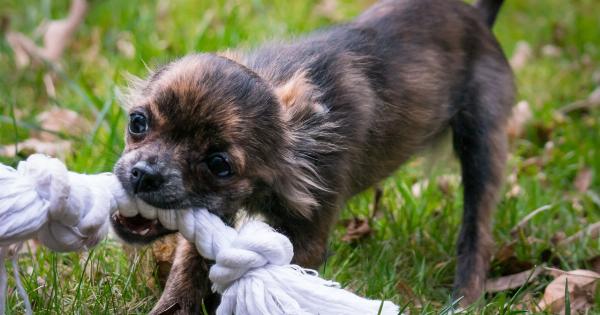Dogs are affectionate and loyal companions, and their personality traits often depend on their environment, breed, and diet. A dog’s diet, in particular, can significantly impact their behavior.
There are several factors to consider when it comes to the connection between dog diet and aggression.
Breed-Specific Diets
Every breed has unique nutritional needs, and providing them with a well-balanced diet is crucial for their health and wellness. Without proper nutrition, some breeds may succumb to aggressive behavior, which could result in a dangerous situation.
For example, Australian Shepherds, Border Collies, and Labrador Retrievers, all high-energy breeds, require high-quality protein and fat to maintain healthy muscle mass and energy levels. If these breeds don’t get enough protein or fat in their diet, they may become aggressive. On the other hand, certain breeds like bulldogs and pugs tend to gain weight quickly and need a more specialized diet to maintain a healthy weight.
Nutrient Deficiencies and Behavioral Effects
One of the most common reasons for aggression in dogs is due to their dietary intake. A lack of specific nutrients in the diet can lead to an imbalance in brain chemistry and trigger aggressive behavior.
For instance, a deficiency in omega-3 fatty acids can lead to increased aggression and anxiety. Omega-3s are essential fatty acids that help regulate brain health, and without these nutrients, dogs may become depressed, anxious, or irritable. Similarly, a lack of vitamin B6 can lead to aggression.
Vitamin B6 plays a significant role in the production of neurotransmitters like serotonin and dopamine which regulate mood and behavior. Without enough vitamin B6 in their diet, dogs may become overly aggressive or anxious.
Processed Food and Behavioral Effects
Many dog owners opt for commercially available dog food, which can contain additives, preservatives, and synthetic flavors. Such elements can have an impact on a dog’s behavior, as they may contain the same chemicals found in human junk food.
Dogs are prone to becoming overweight, which can also affect their personality. A diet high in processed foods can lead to adverse behavioral effects, making dogs more aggressive, hyperactive, and incapable of adapting to new situations.
Such effects, in turn, can lead to the development of several mental and physical health conditions.
Human Food and Behavioral Effects
Dogs often beg for human food, and if they receive it regularly, it can lead to behavioral changes. A significant issue is that human food tends to be high in salt, sugar, and fat, which can trigger aggressive behavior.
Additionally, human food, especially chocolate and other toxic foods for dogs, can lead to adverse behavioral effects such as vomiting, diarrhea, and excessive drooling. The bottom line is that feeding your dog with human food can lead to an imbalance in their diet, leading to behavioral changes.
Allergies and Behavioral Effects
Just like humans, dogs can also develop allergies, resulting in various adverse behavioral effects. Common food allergens for dogs include chicken, beef, dairy, and wheat.
Food allergies can cause itching, stomach upset, and respiratory issues in dogs, leading to aggressive behavior. Similarly, food intolerance can also lead to behavioral changes. Dogs with intolerances may become irritable, uncomfortable, or aggressive if they experience digestive upset or a nutrient deficiency.
Dietary Solutions for Aggressive Behavior
Changing a dog’s diet can help address aggressive behavior. For dogs that require a specialized diet, it’s important to stick to the recommended guidelines for their breed.
Low-quality commercial dog foods should be avoided, and instead, opt for organic or human-grade food. Owners should avoid feeding table scraps or food high in salt, sugar, and fat. If allergy or intolerance issues are a concern, owners can opt for novel protein sources such as fish or rabbit.
Furthermore, supplementing a dog’s diet with essential nutrients like omega-3 fatty acids and vitamin B6 can reduce aggressive behavior by regulating brain chemistry.
Veterinarian Consultation and Behavioral Therapy
If aggressive behavior persists despite a change in diet, dog owners should consult their veterinarian. Veterinarians can assess a dog’s health to determine if their aggression may be linked to an underlying illness or disease.
Additionally, veterinarians can recommend further dietary supplementation to address the issue. If the problem is not dietary, a behaviorist or dog trainer can assist in addressing aggressive behavior.
Conclusion
In conclusion, the quality and composition of a dog’s diet can have a significant impact on their behavior. To ensure that your dog stays healthy both physically and mentally, feeding them a balanced, well-rounded diet is crucial.
Nutrient deficiencies, food allergies, and human food scraps can all trigger aggressive behavior, making it crucial to prioritize a dog’s diet. By working with a veterinarian or pet nutritionist, dog owners can get the guidance needed to create a diet that works for their pet’s unique needs.































